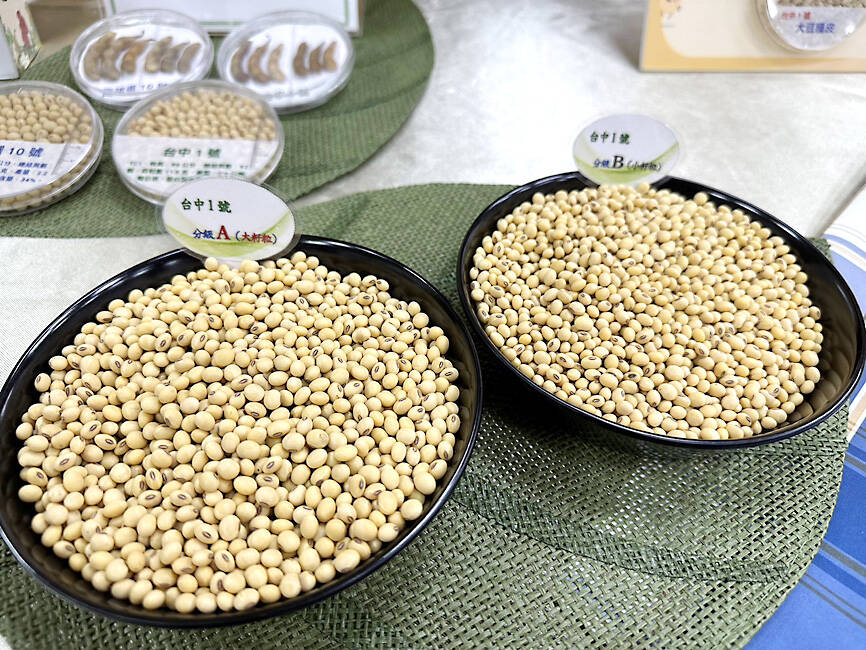Government agronomists on Tuesday unveiled a new variety of high-protein, weather-resistant soybean, which they said could help ease Taiwan’s near-total reliance on imports of the food staple.
The “Taichung No. 1 — September bean” was presented at a news conference after seven years of development by the Taichung District Agricultural Research and Extension Station.
Chen Huan-pin (陳鐶斌), a researcher at the agency, said the bean was notable for its relatively high protein content and low levels of fat, as well as its small kernel size, which makes it ideal for processing.

Photo: Yang Yuan-ting, Taipei Times
The station said the bean is composed of about 40 percent protein by weight, compared with the typical 35 percent, and only 14.6 percent fat, compared with the usual 20 percent.
As a crop, it can be planted as late as mid-September in central Taiwan and harvested 100 days later, therefore reducing the chances of a typhoon wiping out a farmer’s investment, the agency said.
The bean was also bred for improved resistance to soybean stem borers (a common pest) and drought, and has an average yield of about 2,400kg per hectare, the station said.
This year, farmers partnering with the research station planted 350 hectares of the new soybean variety on a trial basis, it said.
The station said that the new soybean variety fits with the government’s plans to expand domestic grain and bean production, and could also help farmers tap into the growing market for soy-based meat substitutes.
Taiwan imported 2.75 million tonnes of soybeans last year, mainly from the US and Brazil, compared with only 5,430 tonnes produced domestically, government data showed.
The Ministry of Agriculture last year set a goal of growing 10 percent of all soybeans for human consumption domestically within five years, equivalent to a more than fivefold increase from 1.9 percent.

The brilliant blue waters, thick foliage and bucolic atmosphere on this seemingly idyllic archipelago deep in the Pacific Ocean belie the key role it now plays in a titanic geopolitical struggle. Palau is again on the front line as China, and the US and its allies prepare their forces in an intensifying contest for control over the Asia-Pacific region. The democratic nation of just 17,000 people hosts US-controlled airstrips and soon-to-be-completed radar installations that the US military describes as “critical” to monitoring vast swathes of water and airspace. It is also a key piece of the second island chain, a string of

A magnitude 5.9 earthquake that struck about 33km off the coast of Hualien City was the "main shock" in a series of quakes in the area, with aftershocks expected over the next three days, the Central Weather Administration (CWA) said yesterday. Prior to the magnitude 5.9 quake shaking most of Taiwan at 6:53pm yesterday, six other earthquakes stronger than a magnitude of 4, starting with a magnitude 5.5 quake at 6:09pm, occurred in the area. CWA Seismological Center Director Wu Chien-fu (吳健富) confirmed that the quakes were all part of the same series and that the magnitude 5.5 temblor was

Taiwan will now have four additional national holidays after the Legislative Yuan passed an amendment today, which also made Labor Day a national holiday for all sectors. The Chinese Nationalist Party (KMT) and Taiwan People’s Party (TPP) used their majority in the Legislative Yuan to pass the amendment to the Act on Implementing Memorial Days and State Holidays (紀念日及節日實施辦法), which the parties jointly proposed, in its third and final reading today. The legislature passed the bill to amend the act, which is currently enforced administratively, raising it to the legal level. The new legislation recognizes Confucius’ birthday on Sept. 28, the

The Central Weather Administration has issued a heat alert for southeastern Taiwan, warning of temperatures as high as 36°C today, while alerting some coastal areas of strong winds later in the day. Kaohsiung’s Neimen District (內門) and Pingtung County’s Neipu Township (內埔) are under an orange heat alert, which warns of temperatures as high as 36°C for three consecutive days, the CWA said, citing southwest winds. The heat would also extend to Tainan’s Nansi (楠西) and Yujing (玉井) districts, as well as Pingtung’s Gaoshu (高樹), Yanpu (鹽埔) and Majia (瑪家) townships, it said, forecasting highs of up to 36°C in those areas